3英语07北京市崇文区高三第一学期期末统一练习
- 格式:doc
- 大小:329.00 KB
- 文档页数:15
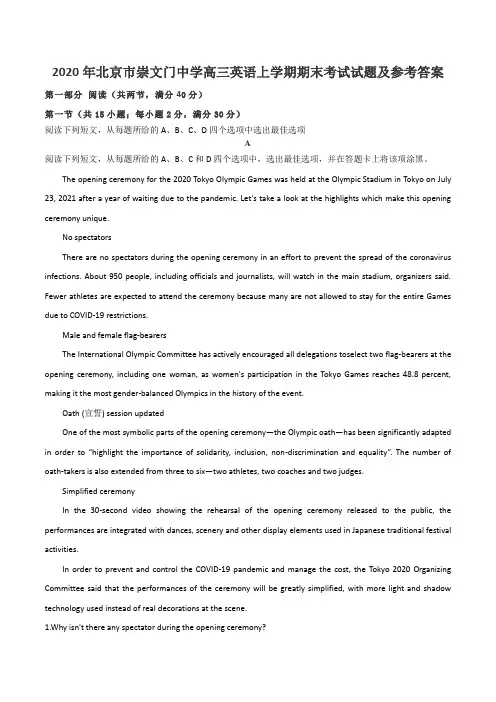
2020年北京市崇文门中学高三英语上学期期末考试试题及参考答案第一部分阅读(共两节,满分40分)第一节(共15小题;每小题2分,满分30分)阅读下列短文,从每题所给的A、B、C、D四个选项中选出最佳选项A阅读下列短文,从每题所给的A、B、C和D四个选项中,选出最佳选项,并在答题卡上将该项涂黑。
The opening ceremony for the 2020 Tokyo Olympic Games was held at the Olympic Stadium in Tokyo on July 23, 2021 after a year of waiting due to the pandemic. Let's take a look at the highlights which make this opening ceremony unique.No spectatorsThere are no spectators during the opening ceremony in an effort to prevent the spread of the coronavirus infections. About 950 people, including officials and journalists, will watch in the main stadium, organizers said. Fewer athletes are expected to attend the ceremony because many are not allowed to stay for the entire Games due to COVID-19 restrictions.Male and female flag-bearersThe International Olympic Committee has actively encouraged all delegations toselect two flag-bearers at the opening ceremony, including one woman, as women's participation in the Tokyo Games reaches 48.8 percent, making it the most gender-balanced Olympics in the history of the event.Oath (宣誓) session updatedOne of the most symbolic parts of the opening ceremony—the Olympic oath—has been significantly adapted in order to “highlight the importance of solidarity, inclusion, non-discrimination and equality”. The number of oath-takers is also extended from three to six—two athletes, two coaches and two judges.Simplified ceremonyIn the 30-second video showing the rehearsal of the opening ceremony released to the public, the performances are integrated with dances, scenery and other display elements used in Japanese traditional festival activities.In order to prevent and control the COVID-19 pandemic and manage the cost, the Tokyo 2020 Organizing Committee said that the performances of the ceremony will be greatly simplified, with more light and shadow technology used instead of real decorations at the scene.1.Why isn't there any spectator during the opening ceremony?A.To limit the number of people present.B.To highlight the spirit of the Olympic Games.C.To control the spread of an infectious disease.D.To make room for the athletes all over the world.2.Why is each delegation encouraged to select one woman as a flag-bearer in Tokyo Olympics?A.Women will be in a leading position in sports.B.Women athletes make up a larger percentage than ever.C.Women will play a more important part in society.D.More and more women will take part in the Olympic Games.3.Which of the following statements is True according to the passage?A.Oath-takers are made up of six athletes.B.Tokyo uses more real decorations to cut the cost.C.About 950 people watch the entire games in the Tokyo Games.D.The opening ceremony presents the traditional culture of Japan.BAbout 12 years ago, Sandy Cambron noticed her mother, Pearl Walker, had become quiet after she moved into a nursing home for patients of Alzheimer's disease inKentucky.“We tried everything — photos, old stories — but nothing worked,” she said. “It was really hard for everyone to see how she had changed.” Then one day whileSandywas in a toy store, she had an idea: Why not givePearla baby doll so she could feel as if she were caring for something again? And why not give one to all the other care center seniors?As soon asSandygavePearlthe doll, her mother's face lit up. “She started talking again and she never went anywhere without that baby,”Sandysaid. “She took 'baby' to the dining room with her and slept with her in her arms every night. When she passed away a year later, we even buried her with that well-loved baby doll.”In the following 10 years, Sandy and her husband, Wayne Cambron, continued to buy dolls and hand them out to the elderly of care centers near their home every New Year. Now Pearl's Memory Babies is anonprofit (非营利) organization that has contributed more than 300 dolls to old people with Alzheimer's disease at nursing homes since February 2018.Last year,Sandyposted New Year’s photos on Facebook, all of which are about seniors reacting to dolls thatshe and Wayne sent to a local nursing home. The post was shared more than 210,000 times overnight. Peoplegave almost $15,000 online. That helped the group buy many dolls.“The dolls offer treatment and comfort,” said Elise Hinchman, who works at a care center inKentucky, "Some seniors cry when they get a doll. And they always rock and talk to their dolls. People with Alzheimer might lose their memories, but they don't lose their ability to love.”4. How did Pearl change after she moved to a nursing home?A. She hardly talked.B. She lost hope in life.C. She felt bored.D. She forgot everything.5. How didPearlreact after receiving the doll?A. She began to cry.B. She was very delighted.C. She played it with a baby.D. She was unconcerned about it.6. What's paragraph 5 mainly about?A. What Sandy did for her mother.B. People's reaction toSandy's post.C. The rising needs for baby dolls.D. HowSandybecame a celebrity.7. What can be a suitable title for the text?A. Good News for Alzheimer's PatientsB. How to Remove Alzheimer's DiseaseC. Baby Dolls Cheer up Alzheimer's PatientsD. Daughter Helps Mother Recover MemoryCHardware in general,and smartphones in particular,have become a huge environmental and health problem in the Global South's landfill sites(垃圾填埋场).Electronic waste(e-waste) currently takes up 5 percent of all global waste,and it is set to increase rapidly as more of us own more than one smartphone,laptop and power bank They end up in places like Agbogbloshie on theoutskirts of Ghana's capital,Accra. It is the biggest e-waste dump in the world,where 10,000 informal workers walk through tons of abandoned goods as part of an informal recycling process.They risk their health searching for the precious metals that are found in abandoned smartphones.But Agbogbloshie should not exist.The Basel Convention,a 1989 treaty,aims to prevent developed nations from unauthorized dumping of e-waste in less developed countries.The e-waste industry,however,circumventsregulations by exporting e-waste labelled as "secondhand goods' to poor countries like Ghana,knowing full well hat it is heading for a landfill site.A recent report found Agbogbloshie contained some of the most dangerous chemicals.This is not surprising: smartphones contain chemicals like mercury(水银),lead and even arsenic(砷).Reportedly, one egg from a free-range chicken in Agbogbloshie contained a certainchemical which can cause cancer and damage the immune system at a level that's about 220 times greater than a limit set by the European Food Safety Authority(EFSA).Most worryingly,these poisonous chemicals are free to pollute the broader soil and water system.This should concern us all, since some ofGhana's top exports are cocoa and nuts.Some governments have started to take responsibility for their consumers' waste.For example,Germanyhas started a project that includes a sustainable recycling system at Agbogbloshie,along with a health clinic for workers.However,governments cannot solve the problem alone, as there is an almost limitless consumer demand for hardware,especially when governments' green policies are focused on issues like climate change.Only the manufacturers can fix this.A more economically sustainable and politically possible solution is through encouraging hardware manufacturers to make the repair, reuse and recycling of hardware profitable,or at least cost-neutral8. What can we infer from Paragraph 2?A. Electronic waste requires more landfill sites acrossGhana.B. Electronic waste is too complex to get fully recycleC. Electronic products need to be improved urgentlyD. Electronic pollution is a burning question in Agbogbloshie9. What does the underlined word "circumvents"in Paragraph 3 mean?A. AbolishesB. TightensC. Brings inD. Gets around10. What should be the best concern according to the text?A. The thread of polluted food around the worldB. The damage of chicken’s immune systemC. The lack of diversity inGhana's exportsD. The violation of EFSA's standards11. What does the author think is the best solution to the e-waste problem?A. Manufacturers' developing a sustainable hardware economyB. Governments’ adjusting their green policies about e-waste.C. Reducing customers' demands for electronic productsD. Manufacturers’ urging the government to make effective policies to ensure more profit.DIt is that time of year when people need to lock their cars. It’ s not because there are a lot of criminals running around stealing cars. Rather, it’ s because of the good-hearted neighbors who want to share their harvest. Especially with this year’s large crop, leaving a car unlocked in my neighborhood is an invitation for someone to stuff it full of zucchini(西葫芦).My sister-in-law, Sharon, recently had a good year for tomatoes. She and her family had eaten and canned so many that they began to feel their skin turn slightly red. That ’ s when she decided it was time to share herblessings.She started calling everyone she knew. When that failed, she began to ask everyone in the neighborhood like a politician, eventually finding a neighbor delighted to have the tomatoes. “ Feel free to take whatever you want,”Sharontold her. She felt happy that she could help someone and that the food didn’t go to waste.A few days later,Sharonanswered the door. There was the neighbor, holding some bread. The neighbor smiled pleasantly, “I want to thank you for all of the tomatoes, and I have to admit that I took a few other things and hope you wouldn’t mind.”Sharoncouldn’t think of anything else in her garden that had been worth harvesting and said so. “Oh, but you did,” the neighbor said. “You had some of the prettiest zucchini I’ve ever seen.”Sharonwas confused. Zucchini in her garden? They hadn’ t even planted any zucchini. But her neighbor insisted that there really were bright-green zucchini in her garden. The two of them walked together into the backyard. When the neighbor pointed at the long green vegetables,Sharonsmiled, “ Well, actually, those are cucumbers that we never harvested, because they got too big, soft and bitter for eating or canning.”The neighbor looked atSharon, shock written all over her face. Then she smiled, and held out the bread that she had shared all over the neighborhood, “I brought you a loaf of cucumber bread. I hope you like it.”12. Why does the author suggest that people in the neighborhood should lock their cars?A. They might be stolen by thieves.B. They might be moved away by the police.C. Their neighbors might fill them with their harvest.D. Their neighbors might throw rubbish in them.13. What does the underlined word “blessings” in the second paragraph mean?A. Tomatoes.B. God’s protection.C.Helpful things.D. Best wishes.14. What did the neighbor do inSharon’s garden?A. She harvested tomatoes only.B. She harvested zucchini by accident.C. She took some cucumbers mistakenly.D. She stole something withoutSharon’s permission.15. We can infer from the article that the neighbor’s bread would taste________.A. bitter but tastyB. strange and bitterC. hard and sourD. soft and sweet第二节(共5小题;每小题2分,满分10分)阅读下面短文,从短文后的选项中选出可以填入空白处的最佳选项。
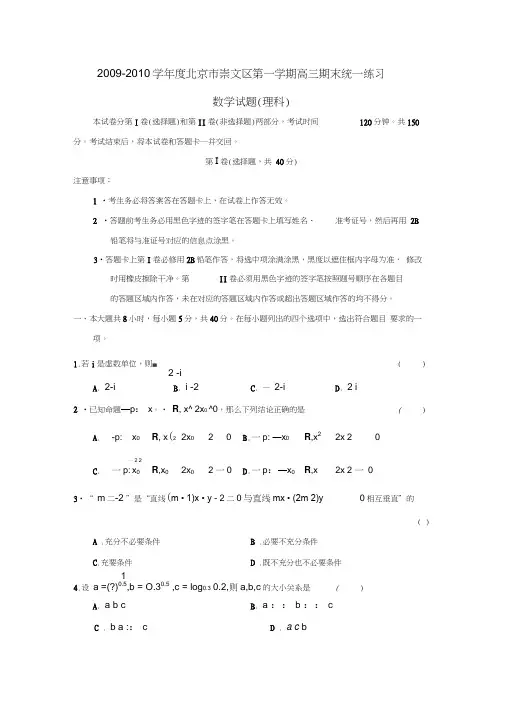
2009-2010学年度北京市崇文区第一学期高三期末统一练习数学试题(理科)本试卷分第I卷(选择题)和第II卷(非选择题)两部分,考试时间120分钟。
共150分。
考试结束后,将本试卷和答题卡一并交回。
第I卷(选择题,共40分)注意事项:1•考生务必将答案答在答题卡上,在试卷上作答无效。
2•答题前考生务必用黑色字迹的签字笔在答题卡上填写姓名、准考证号,然后再用2B 铅笔将与准证号对应的信息点涂黑。
3•答题卡上第I卷必修用2B铅笔作答,将选中项涂满涂黑,黑度以遮住框内字母为准,修改时用橡皮擦除干净。
第II卷必须用黑色字迹的签字笔按照题号顺序在各题目的答题区域内作答,未在对应的答题区域内作答或超出答题区域作答的均不得分。
一、本大题共8小时,每小题5分,共40分。
在每小题列出的四个选项中,选出符合题目要求的一项。
1.若i是虚数单位,则= ( )2 -iA. 2-iB. i -2C. —2-iD. 2 i2 •已知命题—p: x。
• R, x^ 2x0 ^0,那么下列结论正确的是()A. -p: x0R, x(2 2x0 2 0B.一p: —x0R,x22x 2 0-- 2 2C. 一p: x0R,x02x0 2 一0D.一p:—x0R,x 2x 2 一03•“ m二-2 ”是“直线(m • 1)x • y - 2二0与直线mx • (2m 2)y0相互垂直”的( )A .充分不必要条件B .必要不充分条件C.充要条件 D .既不充分也不必要条件14.设a =(?)0.5,b = O.30.5 ,c = log0.30.2,则a,b,c的大小关系是()A. a b cB. a :: b :: cC . b a :: cD . a c b15 •已知f(x)是定义在R上的偶函数,并满足 f (x 2)f (x) =x -2,贝y f (6.5)二A• 4. 5 B• —4. 56 •某程序框图如图所示,该程序运行后输出A. 27B. 31C. 152 27 .已知点F, A分别是椭圆笃笃a b1(a b - 0)的左焦点、右顶点, FB AB =0,则椭圆的离心率等于■ 3 -12&若函数f (X) i 2(a酬bx (aJ) -1的定义域为R,贝U b - 3a的取值范围是B . 1-3,::第n卷(共110分)、填空题:本大题共6小题,每小题5分,共30分。
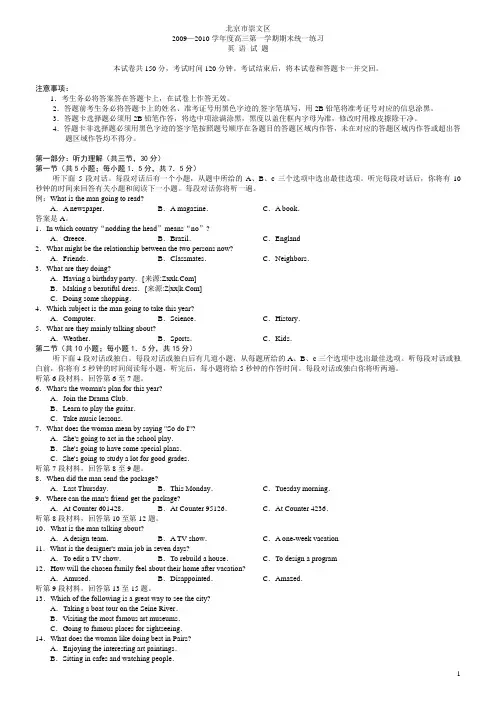
北京市崇文区2009—2010学年度高三第一学期期末统一练习英语试题本试卷共150分,考试时间120分钟。
考试结束后,将本试卷和答题卡一并交回。
注意事项:1.考生务必将答案答在答题卡上,在试卷上作答无效。
2.答题前考生务必将答题卡上的姓名、准考证号用黑色字迹的签字笔填写,用2B铅笔将准考证号对应的信息涂黑。
3.答题卡选择题必须用2B铅笔作答,将选中项涂满涂黑,黑度以盖住框内字母为准,修改时用橡皮擦除干净。
4.答题卡非选择题必须用黑色字迹的签字笔按照题号顺序在各题目的答题区域内作答,未在对应的答题区域内作答或超出答题区域作答均不得分。
第一部分:听力理解(共三节,30分)第一节(共5小题;每小题1.5分,共7.5分)听下面5段对话。
每段对话后有一个小题,从题中所给的A、B、c三个选项中选出最佳选项。
听完每段对话后,你将有10秒钟的时间来回答有关小题和阅读下一小题。
每段对话你将听一遍。
例:What is the man going to read?A.A newspaper.B.A magazine.C.A book.答案是A。
1.In which country“nodding the head”means“no”?A.Greece.B.Brazil.C.England2.What might be the relationship between the two persons now?A.Friends.B.Classmates.C.Neighbors.3.What are they doing?A.Having a birthday party.[来源:]B.Making a beautiful dress.[来源:Z|xx|]C.Doing some shopping.4.Which subject is the man going to take this year?A.Computer.B.Science.C.History.5.What are they mainly talking about?A.Weather.B.Sports.C.Kids.第二节(共10小题;每小题1.5分,共15分)听下面4段对话或独白。
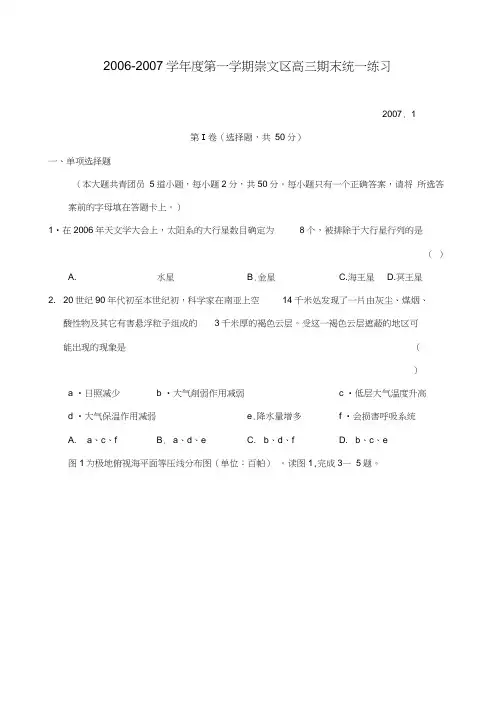
2006-2007学年度第一学期崇文区高三期末统一练习2007. 1第I卷(选择题,共50分)一、单项选择题(本大题共青团员5道小题,每小题2分,共50分。
每小题只有一个正确答案,请将所选答案前的字母填在答题卡上。
)1•在2006年天文学大会上,太阳系的大行星数目确定为8个,被排除于大行星行列的是()A. 水星B.金星C.海王星D.冥王星2. 20世纪90年代初至本世纪初,科学家在南亚上空14千米处发现了一片由灰尘、煤烟、酸性物及其它有害悬浮粒子组成的3千米厚的褐色云层。
受这一褐色云层遮蔽的地区可能出现的现象是()a •日照减少b •大气削弱作用减弱c •低层大气温度升高d •大气保温作用减弱e.降水量增多 f •会损害呼吸系统A. a、c、fB. a、d、eC. b、d、fD. b、c、e图1为极地俯视海平面等压线分布图(单位:百帕)。
读图1,完成3—5题。
3. 图1中表示南极冬季的是A. aB . bC. cD. d4. 关于图1小图a 、b 中字母 M K 的正确叙述是 ()A. M 为南半球的极地东风带B. M 为北半球的西风带C. K 常年盛行西北风D. K 常年盛行东南风5.与北极地区相比,南极被喻为“世界的风极”的原因是南极地区 ()a .海拔高,冰雪表面摩擦力大b .相对高差大c .冰雪反射率大,气温低d .比热大,空气上升运动强烈 A . a 、bB . b 、cC. c 、dD. a 、d6. 诗句“风怒欲拔木,雨暴欲掀屋。
风声翻海涛,雨点堕车轴。
是 A.热带气旋B .高压 C.()D.反气旋7. 滇藏公路经常出现塌方,下列作用中与产生这一问题相关的是a .侵蚀、风化作用强烈 c .地壳运动活跃e .开山修路打破了岩层的受力平衡 b .沉积作用强烈 d .古老的地层不坚固A . b 、dB . a 、b 、cC. a 、c 、eD. d 、e反映影响天气的主要系统( )在一定的地质作用下,某些有用的矿物富集形成了矿产。
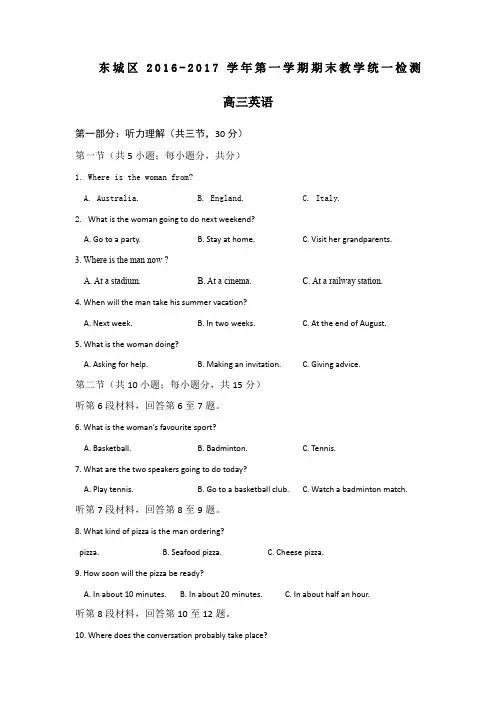
东城区2016-2017学年第一学期期末教学统一检测高三英语第一部分:听力理解(共三节,30分)第一节(共5小题;每小题分,共分)1. Where is the woman from?A. Australia.B. England.C. Italy.2. What is the woman going to do next weekend?A. Go to a party.B. Stay at home.C. Visit her grandparents.3. Where is the man now ?A. At a stadium.B. At a cinema.C. At a railway station.4. When will the man take his summer vacation?A. Next week.B. In two weeks.C. At the end of August.5. What is the woman doing?A. Asking for help.B. Making an invitation.C. Giving advice.第二节(共10小题;每小题分,共15分)听第6段材料,回答第6至7题。
6. What is the woman’s favourite sport?A. Basketball.B. Badminton.C. Tennis.7. What are the two speakers going to do today?A. Play tennis.B. Go to a basketball club.C. Watch a badminton match.听第7段材料,回答第8至9题。
8. What kind of pizza is the man ordering?pizza. B. Seafood pizza. C. Cheese pizza.9. How soon will the pizza be ready?A. In about 10 minutes.B. In about 20 minutes.C. In about half an hour.听第8段材料,回答第10至12题。
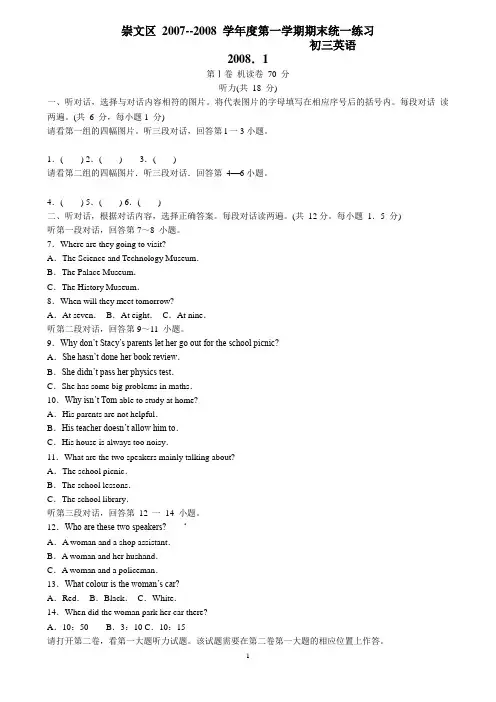
崇文区2007--2008 学年度第一学期期末统一练习初三英语2008.1第Ⅰ卷机读卷70 分听力(共18 分)一、听对话,选择与对话内容相符的图片。
将代表图片的字母填写在相应序号后的括号内。
每段对话读两遍。
(共 6 分,每小题1 分)请看第一组的四幅图片。
听三段对话,回答第l一3小题。
1.( ) 2.( ) 3.( )请看第二组的四幅图片.听三段对话.回答第4—6小题。
4.( ) 5.( ) 6.( )二、听对话,根据对话内容,选择正确答案。
每段对话读两遍。
(共12分。
每小题1.5 分)听第一段对话,回答第7~8 小题。
7.Where are they going to visit?A.The Science and Technology Museum.B.The Palace Museum.C.The History Museum.8.When will they meet tomorrow?A.At seven.B.At eight.C.At nine.听第二段对话,回答第9~11 小题。
9.Why don‟t Stacy‟s parents let her go out for the school picnic?A.She hasn‟t done her book review.B.She didn‟t pass her physics test.C.She has some big problems in maths.10.Why isn‟t Tom able to study at home?A.His parents are not helpful.B.His teacher doesn‟t allow him to.C.His house is always too noisy.11.What are the two speakers mainly talking about?A.The school picnic.B.The school lessons.C.The school library.听第三段对话,回答第12 一14 小题。
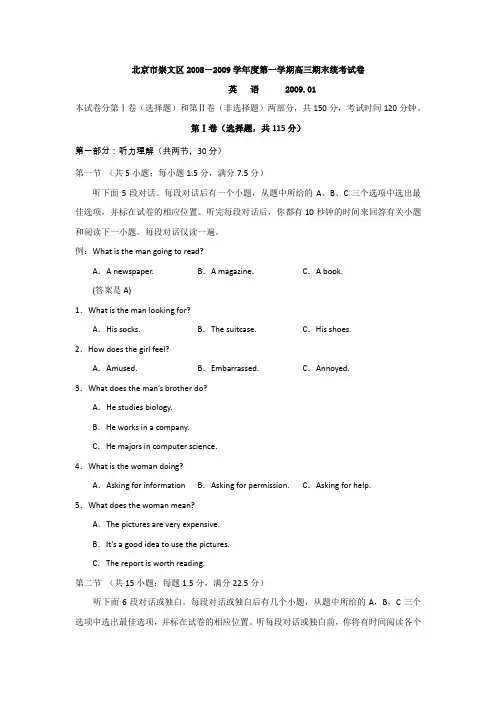
北京市崇文区2008-2009学年度第一学期高三期末统考试卷英语 2009.01本试卷分第Ⅰ卷(选择题)和第Ⅱ卷(非选择题)两部分,共150分,考试时间120分钟。
第Ⅰ卷(选择题,共115分)第一部分:听力理解(共两节,30分)第一节(共5小题;每小题1.5分,满分7.5分)听下面5段对话。
每段对话后有一个小题,从题中所给的A、B、C三个选项中选出最佳选项,并标在试卷的相应位置。
听完每段对话后,你都有10秒钟的时间来回答有关小题和阅读下一小题。
每段对话仅读一遍。
例:What is the man going to read?A.A newspaper. B.A magazine. C.A book.(答案是A)1.What is the man looking for?A.His socks. B.The suitcase. C.His shoes.2.How does the girl feel?A.Amused. B.Embarrassed. C.Annoyed.3.What does the man’s brother do?A.He studies biology.B.He works in a company.C.He majors in computer science.4.What is the woman doing?A.Asking for information B.Asking for permission. C.Asking for help.5.What does the woman mean?A.The pictures are very expensive.B.It’s a good idea to use the pictures.C.The report is worth reading.第二节(共15小题;每题1.5分,满分22.5分)听下面6段对话或独白。
每段对话或独白后有几个小题,从题中所给的A,B,C三个选项中选出最佳选项,并标在试卷的相应位置。
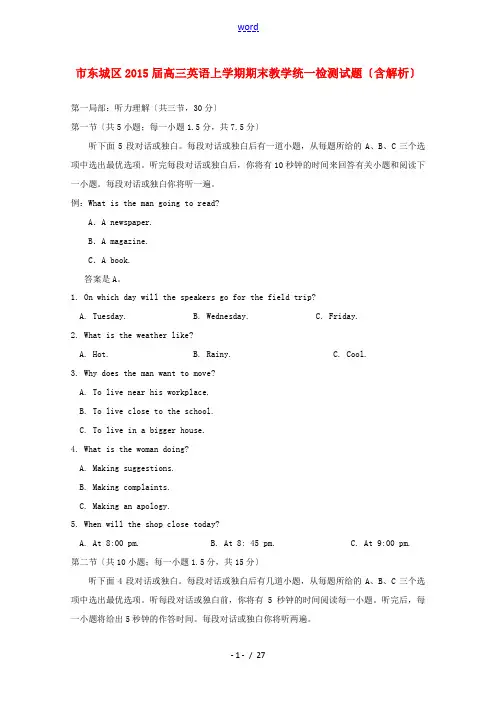
市东城区2015届高三英语上学期期末教学统一检测试题〔含解析〕第一局部:听力理解〔共三节,30分〕第一节〔共5小题;每一小题1.5分,共7.5分〕听下面5段对话或独白。
每段对话或独白后有一道小题,从每题所给的A、B、C三个选项中选出最优选项。
听完每段对话或独白后,你将有10秒钟的时间来回答有关小题和阅读下一小题。
每段对话或独白你将听一遍。
例:What is the man going to read?A.A newspaper.B.A magazine.C.A book.答案是A。
1. On which day will the speakers go for the field trip?A. Tuesday.B. Wednesday.C. Friday.2. What is the weather like?A. Hot.B. Rainy.C. Cool.3. Why does the man want to move?A. To live near his workplace.B. To live close to the school.C. To live in a bigger house.4. What is the woman doing?A. Making suggestions.B. Making complaints.C. Making an apology.5. When will the shop close today?A. At 8:00 pm.B. At 8: 45 pm.C. At 9:00 pm. 第二节〔共10小题;每一小题1.5分,共15分〕听下面4段对话或独白。
每段对话或独白后有几道小题,从每题所给的A、B、C三个选项中选出最优选项。
听每段对话或独白前,你将有5秒钟的时间阅读每一小题。
听完后,每一小题将给出5秒钟的作答时间。
每段对话或独白你将听两遍。
听第6段材料,回答第6至7题。
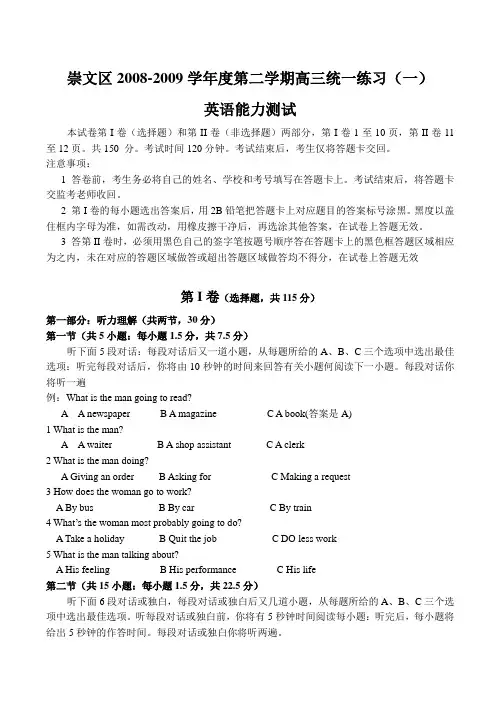
崇文区2008-2009学年度第二学期高三统一练习(一)英语能力测试本试卷第I卷(选择题)和第II卷(非选择题)两部分,第I卷1至10页,第II卷11至12页。
共150 分。
考试时间120分钟。
考试结束后,考生仅将答题卡交回。
注意事项:1 答卷前,考生务必将自己的姓名、学校和考号填写在答题卡上。
考试结束后,将答题卡交监考老师收回。
2 第I卷的每小题选出答案后,用2B铅笔把答题卡上对应题目的答案标号涂黑。
黑度以盖住框内字母为准,如需改动,用橡皮擦干净后,再选涂其他答案,在试卷上答题无效。
3 答第II卷时,必须用黑色自己的签字笔按题号顺序答在答题卡上的黑色框答题区域相应为之内,未在对应的答题区域做答或超出答题区域做答均不得分,在试卷上答题无效第I卷(选择题,共115分)第一部分:听力理解(共两节,30分)第一节(共5小题:每小题1.5分,共7.5分)听下面5段对话:每段对话后又一道小题,从每题所给的A、B、C三个选项中选出最佳选项:听完每段对话后,你将由10秒钟的时间来回答有关小题何阅读下一小题。
每段对话你将听一遍例:What is the man going to read?A A newspaperB A magazineC A book(答案是A)1 What is the man?A A waiterB A shop assistantC A clerk2 What is the man doing?A Giving an orderB Asking forC Making a request3 How does the woman go to work?A By busB By carC By train4 What’s the woman most probably going to do?A Take a holidayB Quit the jobC DO less work5 What is the man talking about?A His feelingB His performanceC His life第二节(共15小题:每小题1.5分,共22.5分)听下面6段对话或独白,每段对话或独白后又几道小题,从每题所给的A、B、C三个选项中选出最佳选项。
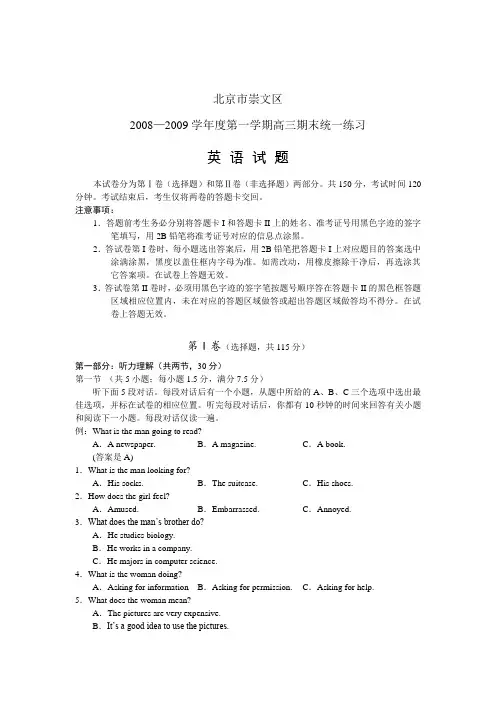
北京市崇文区2008—2009学年度第一学期高三期末统一练习英语试题本试卷分为第Ⅰ卷(选择题)和第Ⅱ卷(非选择题)两部分。
共150分,考试时间120分钟。
考试结束后,考生仅将两卷的答题卡交回。
注意事项:1.答题前考生务必分别将答题卡I和答题卡II上的姓名、准考证号用黑色字迹的签字笔填写,用2B铅笔将准考证号对应的信息点涂黑。
2.答试卷第I卷时,每小题选出答案后,用2B铅笔把答题卡I上对应题目的答案选中涂满涂黑,黑度以盖住框内字母为准。
如需改动,用橡皮擦除干净后,再选涂其它答案项。
在试卷上答题无效。
3.答试卷第II卷时,必须用黑色字迹的签字笔按题号顺序答在答题卡II的黑色框答题区域相应位置内,未在对应的答题区域做答或超出答题区域做答均不得分。
在试卷上答题无效。
第I卷(选择题,共115分)第一部分:听力理解(共两节,30分)第一节(共5小题;每小题1.5分,满分7.5分)听下面5段对话。
每段对话后有一个小题,从题中所给的A、B、C三个选项中选出最佳选项,并标在试卷的相应位置。
听完每段对话后,你都有10秒钟的时间来回答有关小题和阅读下一小题。
每段对话仅读一遍。
例:What is the man going to read?A.A newspaper. B.A magazine. C.A book.(答案是A)1.What is the man looking for?A.His socks. B.The suitcase. C.His shoes.2.How does the girl feel?A.Amused. B.Embarrassed. C.Annoyed.3.What does the man’s brother do?A.He studies biology.B.He works in a company.C.He majors in computer science.4.What is the woman doing?A.Asking for information B.Asking for permission. C.Asking for help.5.What does the woman mean?A.The pictures are very expensive.B.It’s a good idea to use the pictures.C.The report is worth reading.第二节(共15小题;每题1.5分,满分22.5分)听下面6段对话或独白。
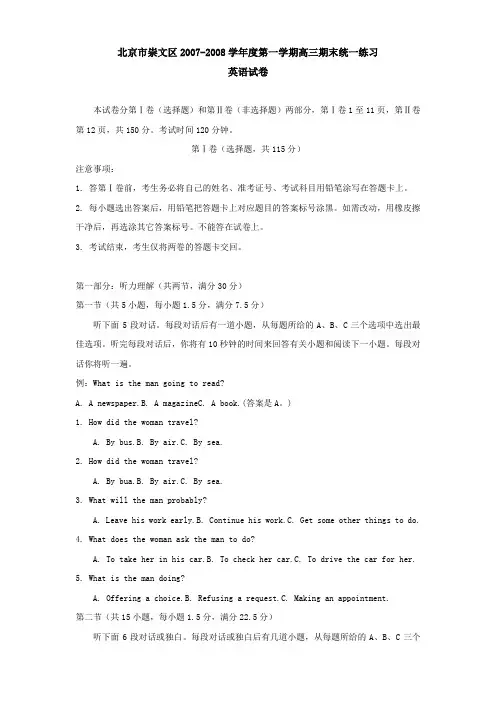
北京市崇文区2007-2008学年度第一学期高三期末统一练习英语试卷本试卷分第Ⅰ卷(选择题)和第Ⅱ卷(非选择题)两部分,第Ⅰ卷1至11页,第Ⅱ卷第12页,共150分。
考试时间120分钟。
第Ⅰ卷(选择题,共115分)注意事项:1. 答第Ⅰ卷前,考生务必将自己的姓名、准考证号、考试科目用铅笔涂写在答题卡上。
2. 每小题选出答案后,用铅笔把答题卡上对应题目的答案标号涂黑。
如需改动,用橡皮擦干净后,再选涂其它答案标号。
不能答在试卷上。
3. 考试结束,考生仅将两卷的答题卡交回。
第一部分:听力理解(共两节,满分30分)第一节(共5小题,每小题1.5分,满分7.5分)听下面5段对话。
每段对话后有一道小题,从每题所给的A、B、C三个选项中选出最佳选项。
听完每段对话后,你将有10秒钟的时间来回答有关小题和阅读下一小题。
每段对话你将听一遍。
例:What is the man going to read?A. A newspaper.B. A magazineC. A book.(答案是A。
)1. How did the woman travel?A. By bus.B. By air.C. By sea.2. How did the woman travel?A. By bua.B. By air.C. By sea.3. What will the man probably?A. Leave his work early.B. Continue his work.C. Get some other things to do.4. What does the woman ask the man to do?A. To take her in his car.B. To check her car.C. To drive the car for her.5. What is the man doing?A. Offering a choice.B. Refusing a request.C. Making an appointment.第二节(共15小题,每小题1.5分,满分22.5分)听下面6段对话或独白。
2009-2010学年度北京市崇文区第一学期高三期末统一练习地理试题本试卷分第I 卷(选择题)和第II 卷(非选择题)两部分,满分 100分,考试时间90分钟。
注意事项:1 •答卷前,考生务必将自己的姓名、准考证号、考试科目涂写在答题卡上,并将所在学校、班级、姓名填写在答题卡的密封线内。
考试结束后,将试卷和答题卡一并交监考老师收 回。
2 •第I 卷的每小题选出答案后, 用2B 铅笔把答题卡上对应题目的答案标号涂黑。
如需改动,用橡皮擦干净后,再选涂其它答案标号,不能作答在试卷上。
第 II 卷部分,用黑色签字笔作答在答题卡相应的位置上。
第I 卷选择题(共45分)下列各小题均有四个选项,其中只有一个符合题意要求的。
请将所选答案前字母,按规 定要求填涂在答题卡第 1— 45题的相应位置上 。
(每小题1分,选对一项得1分,多选则该 小题不得分。
)1 •能够直观表示沿某一经线地势起伏、坡度陡缓状况的是A •等高线地形图 C .分层设色地形图2 •周围与五个大洲相邻的大洋是A •太平洋、北冰洋 C .大西洋、太平洋3 •在英国伦敦格林尼治天文台的院子里,一条备受世界瞩目的金属线嵌在地面上,把脚跨在这根金属线的两侧,意味着脚踩 ( )B •南、北两个纬度B .地形剖面图 D .电子地形分布图B •印度洋、大西洋 D .北冰洋、印度洋 A .东、西两半球C .南、北两半球读下图,完成4— 6题。
D .东、西两个经度4 •图中表示地理信息的线状符号有()A. 2种 B . 3种 C . 4种 D . 6种5.图中Q地的年降雪日数可能是( )A. 8天 B . 12天 C . 9天 D . 4天6.造成P地一月等温线向北弯曲的原因是该地( )A. 地势较低,气温较咼 B . 地势较咼,气温较低C. 降水量少,气温较低 D . 有河流流经,气温较咼我国历史上曾记载:公元28年“三月乙未,日出黄,有黑气大如钱,居日中央。
2020年北京市崇文门中学高三英语上学期期末试题及参考答案第一部分阅读(共两节,满分40分)第一节(共15小题;每小题2分,满分30分)阅读下列短文,从每题所给的A、B、C、D四个选项中选出最佳选项AThe question of whether our government should promote science and technology or the liberal arts in higher education isn’t an either / or one, although the current emphasis on preparing young Americans for STEM (science, technology, engineering, maths)-related fields can make it seem that way.The latest congressional report acknowledges the critical importance of technical training, but also insists that the study of the humanities and social sciences must remain central elements of America’s educational system at all levels. Both areas are the key to producing citizens who can participate effectively in our democratic society, become innovative leaders, and benefit from the spiritual enrichment that the reflection on the great ideas of mankind over time provides.Parents and students who have invested heavily in higher education worry about graduates’ job prospects as technological advances and changes in domestic and global markets transform professions in ways that reduce wages and cut jobs. Under these circumstances, it’s natural to look for what may appear to be the most “practical” way out of the problem; “major in a subject designed to get you a job” seems the obvious answer to some, though this ignores the fact that many disciplines in the humanities characterized as “soft” often, in fact, lead to employment and success in the long run. Indeed, according to surveys, employers have expressed a preference for students who have received a broadly-based education that has taught them to write well, think critically, research creatively, and communicate easily.Moreover, students should be prepared not just for their first job, but for their 4th and 5th jobs, as there’s little reason to doubt that people entering the workforce today will be called upon to play many different roles over the course of their careers. The ones who will do the best in this new environment will be those whose educations have prepared them to be flexible. The ability to take advantage of every available tool and insight—picked up from science, arts, and technology—to solve the problems of the future, and seize the opportunities, will be helpful to them and the nation.1. What does the latest congressional report suggest?A. STEM-related subjects help students find jobs in the information society.B. The humanities and STEM subjects should be given equal importance.C. The liberal arts in higher education help enrich students’ spiritual life.D. Higher education should be adjusted to the practical needs of society.2. What is the main concern of students when they choose a major?A. Their interest in relevant subjects.B. The academic value of the courses.C. The quality of education to receive.D. Their chances of getting a good job.3. What does the author say about the so called “soft” subjects?A. They benefit students in their future life.B. They broaden students’ range of interests.C. They just improve students’ communication skills.D. They are essential to students’ healthy growth.BContrary to the long-held belief that plants in the natural world are always in competition, new research has found that in severe environments adult plants help smaller ones and grow well as a result.The research, led by Dr Rocio, studied adult and seedling (幼苗)plants in the ecological desert in the south-east of Spain. Dr Rocio said, “If you're a seedling in a poor land — the top of a mountain or a sand hill, for example-and you’re lucky enough to end up underneath a big plant, your chances of survival are certainly better than if you landed somewhere on your own. What we have found, which was surprising, is an established large plant, called a ‘nurse’, protects a seedling; it also produces more flowers than the same plants of similar large size growing on their own.”Other benefits of nurse-seedling partnerships include that more variety of plants growing together can have a positive effect on the environment. For example, vegetation areas with nurse plants with more flowers might be able to attract higher numbers of pollinators(传粉者)in an area, in turn supporting insect and soil life and even provide a greater range of different fruit types for birds and other animals.“The biggest winner for this system of nursing a plant is biodiversity(生物多样性),” Dr Rocio said. “The more biodiversean area, the greater number of species of plants, insect life, mammals and birds, and the better the chances of long-term healthy functioning of the environment and ecosystems. ” This system is win-win for adult and seedling plants in unfavorable environments.The research is of value to those who manage and protect plants in tough environments. Most home gardeners and farmers plan to ensure their soil and conditions are the best they can be for plant growth, but the findings might be of value to those who garden in bare places.4. What is a common understanding of plants?A. They can help each other.B. They can survive ill conditions.C. They compete with each other.D. They grow well on their own.5. What will happen to seedling plants if they grow under adult plants?A. They will produce more flowers.B. They will die owing to competition.C. They will make adult plants larger.D. They will get support from adult plants.6. What is the effect of the nurse-seedling partnership?A. It leads to unfavorable environments.B. It produces long-term healthy chances.C. It attracts higher and larger pollinators.D It provides a more variety of plant types.7. Who will benefit from the new research?A. People studying organic farming.B. People protecting plants on sand hills.C. People wanting to change biodiversity.D. People keeping more animals on the farm.CHave you ever been sad because of failure? Please remember, for quite often achieving what you set out to do is not the most important thing.A boy decided to dig a deep hole behind his house. As he was working, a couple of older boys stopped by to watch. “What are you doing?” asked one of the visitors. “I want to dig a hole all the way through the earth!” the boy answered excitedly. The older boys began to laugh, telling him that digging a hole all the way through the earth was impossible. After a while, the boy picked up a jar. He showed it to the visitors. It was full of all kinds of stones and insects. Then he said calmly and confidently, “Maybe I can’t finish digging all the way through the earth, but look at what I’ve found during this period!”Theboy’s goal was far too difficult, but it did cause him to go on. And that is what a goal is for-to cause us to move in the direction we have chosen, in other words, to cause us to keep working!Not every goal will be fully achieved. Not every job will endup with a success. Not every dream will come true. But when you fall short of your aim, maybe you can say, “Yes, but look at what I’ve found along the way! There are so many wonderful things having come into my life because I tried to do something!” It is in the digging that life is lived. It is the unexpected joy on the journey that really makes sense.8. The older boys laughed at the boy because he was thought to be______.A. braveB. impoliteC. foolishD. warm-hearted9. Why did the boy show the jar to the older boys?A. To drive them away.B. To show what he had found in digging.C. To show how beautiful the jar was.D. To attract them to join him in the work.10. What can be learnt from the fourth paragraph of the text?A. No dream can come true.B. All work will end successfully.C. Goals shouldn’t be set too high.D. Goals will make us work harder.11. The best title for the text should be______.A. A Boy Dug a HoleB. Joy in the JourneyC. No Pain, No GainsD. Failure Is the Mother of SuccessDOne rainy afternoon, I was on a crosstown bus when ayoung woman jumped on. She had a child with her who must have been about 3 or 4 years old.The bus was full, bumpy, and it soon got noisy as her kid began crying because he couldn’t sit next to his mother. There were a couple of open seats, but they weren’t together. She wasflusteredand looked embarrassed.Then another woman, a little older, stood up and moved so that the mother and child could sit together. The mom smiled as a thank-you. And then three words came out of the older woman’s mouth that elevated the entire energy of that bus ride: “I’ve been there”.Simple, undramatic and honest. In that moment, it seemed to unite people. Why? Because almost all experiences are shared human experiences. We forget that, as we forge (前进) through life, focused onour owntroubles and needs—which are actually less unique than we think. How can these three words create more connection in your life? Ask yourself: “Where am I holding back?One thing I know for sure is this: Healing others helps heal yourself. I noticed this recently with my friend, Tracy, who took a new friend who had suffered a miscarriage under her wing. Tracy had three of them before having her daughter two years ago. Our intellect needs a doctor to explain the medical side of things, yes. But our souls need human connection to help us along. No one can do that better than someone who has been exactly where you are.Can the essence of these three words help you make a small difference right now? It can be as simple as volunteering your seat, sharing some helpful advice or even lightening the mood with a joke when you notice that someone’s uncomfortable—because we’re all in this together.12. The underlined word “flustered” in the second paragraph is closest in meaning to _______.A. angryB. anxiousC.scaredD. upset13. What does the woman mean by saying “ I’ve been there”in the third paragraph?A. The woman was on the bus and saw what had happened to the boy.B. The woman got to her destination and was ready to get off the bus.C. The woman once had the similar experience with that mother.D. The woman took the exact seat that the boy was on just now.14. Which of the following statements is TRUE according to the passage?A. Everyone has his or her own unique problem that is difficult to solve.B. Doctors can help us get through when we have mental or physical problems.C. The author’s friend Tracy felt better after she was comforted by her new friend.D. One can indeed make a difference to those in need of help by doing simple things.15. The passage isintended to _______.A. show a harmonious world by telling some touching storiesB. praise those who are willing to help others in emergenciesC. appeal to readers to give timely help to those in needD. illustrate some ways of helping others in detail第二节(共5小题;每小题2分,满分10分)阅读下面短文,从短文后的选项中选出可以填入空白处的最佳选项。
崇文区2008-2009学年度第二学期高三统一练习(一)英语能力测试本试卷第I 卷(选择题)和第II 卷(非选择题)两部分,第I 卷1至10页,第II 卷11至12页。
共150 分。
考试时间120分钟。
考试结束后,考生仅将答题卡交回。
注意事项:1答卷前,考生务必将自己的姓名、学校和考号填写在答题卡上。
考试结束后,将答题卡交监考老师 收回。
2第I 卷的每小题选出答案后,用2B 铅笔把答题卡上对应题目的答案标号涂黑。
黑度以盖住框内字母为准,如需改动,用橡皮擦干净后,再选涂其他答案,在试卷上答题无效。
3答第II 卷时,必须用黑色自己的签字笔按题号顺序答在答题卡上的黑色框答题区域相应为之内,未 在对应的答题区域做答或超出答题区域做答均不得分,在试卷上答题无效第I 卷(选择题,共115 分)第一部分:听力理解(共两节, 30分) 第一节(共5小题:每小题1.5分,共7.5分)听下面5段对话:每段对话后又一道小题,从每题所给的 A 、B C 三个选项中选出最佳选项:听完每段对话后,你将由10秒钟的时间来回答有关小题何阅读下一小题。
每段对话你将听一遍例: What is the man going to read?听下面6段对话或独白,每段对话或独白后又几道小题,从每题所给的 A 、B 、C 三个选项中选出最佳选项。
听每段对话或独白前,你将有 5秒钟时间阅读每小题:听完后,每小题将给出 5秒钟的作答时间。
每段对话或独白你将听两遍。
听第6段材料,回答6至7题 6 What is the man? A She is taking a taxi B She is praetieing driving C She is having a driving test 7 What is the woma n doing? A5:30pmB 6:00 pmC8:00pm听第7段材料,回答第8至9题8 What time does the store close on weekdays? A A5:30pmB 6:00 pmC8:00pmA A n ewspaper 1 What is the man?A A waiter2 What is the man doing? A Givi ng an orderB A magaz ine B A shop assistantB Aski ng for3 How does the woma n go to work? A By bus B By car4 What 'the woman most probably going to do? A Take a holiday B Quit the job5 What is the man talk ing about?A His feeli ngB His performa nee第二节(共15小题:每小题1.5分,共22.5 分)C A book (答案是A ) C A clerkC Making a requestC By train C DO less work C His life9 Why does the woma n make the speech? A To attract more customers B To in troduce the products C To advertise the new store 听第8段材料,回答第10-12题10 What does the girl have to do on Wed nesday after school? A Practice the pia noB Play football11 Which movie show ing is the girl going to see? A 4:30 B 5:00 12 Who will go to the movie with the girl? A her father B her n eighbor 听第9段材料,回答第13至15题 13 Where does the con versati on most probably take place?A At the airportB In a restaura nt 14 Home long will they stay in Rome? A A weekB Twenty days15 What do we know about the man?A He is talkativeB He is n ervous 听第10段材料,回答第16至18小题 16 What does the man think about his work? A It is very good B In a hotel 17 Where does the man live now? A In his workplace. B In a hotel18 What are the two speakers talki ng about? A The man 'lifeB The man 'roommate听地11段材料,回答19至20题 19 What is she percentage of the class participation in the final results ?A50%B 30%C 20%20 What is the speaker talki ng about?A The class rulesB The gradi ng methodsC The exam in struct ions第二部分:知识运用(共两节,45分)第一节 单项提填空(共15小题:每小题1分,共15分)从每小题所给的 A 、B 、C 、D 四个选项中,选出可以填入空白处的最佳选项,并在答题卡上将该项涂 里 八、、例: It 'so nice to hear from her aga in. _____________ ,we last met more tha n thirty years ago A What 'more B That's to sayC In other wordsD Believe it or not答案是:D21 It was a rather rating boring class: ____________ the part about using data was quite usefulA andB butC forD so 22 It 'too noisy here, Can we go somewhere __________ ?A quietlyB more quietlyC much quietD quieter23 Maria 'father is very striel with her and won 'allow ______________ t o fail A herB himC herselfD himself24 I like to keep fit, so I go swim ming _________ I canC Join in the scie nee fair C 9:00C Her friendC At home C A mon th C He is impatie ntC In an apartme nt C In an apartme ntC The man 'work ing experie neeA as soon asB as fast asC as ofte n as 25 Once employed ,Simon ________ to Africa to do market researchA will be sentB is sentC has bee n sent26The photographs of MS, kerry , ________________ she often makes her family members her subjects ,are ofgreat valueA for whomB in whichC about whichD of whom27 Oh! My god! A file seems _______ by mistake!A deletedB to be deletedC being deletedD to have bee n deleted28 _______ the water run while you brush your teeth wastes water A Don 'let B LetC Not lett ingD Lett ing 29 Several of today 'football games _________ because of heavy snowA postp onedB are postp onedC have bee n postp onedD have postp oned30 There is a danger _________ museums will attempt to entertain rather than educateA whyB thatC whereDwhich 31 __________ the noise ,Tony bent to look out of the window, __________ the curtains with one hand.A To hear ,to partB Heari ng, part ingC heard ,part ingD To have heard ,to part32 — I ' m not feeling well.—I know. it ' s the kind of illness leaves you feeling low. A that B whichC whatD 不填33 The bear _________ that way — you can see its tracks in the snow. A whe n B had go ne C what D will go 34Why did she steal things __________ she could easily afford to buy them?A whe nB si neeC in easeD so that 35 I can 'tstand living in a bus city where people are always in a rush and ___________ to move to another place.A inten dedB intendingC to intendD intend第三节 完型填空(共20小题:每小题1.5分,共30分)阅读下列短文,从每小题所给的 A 、B 、C 、D 四个选项中,选出最佳选项,并答题卡上将该项涂黑。
崇文区2007—2008学年度第二学期高三统一练习(二)语文 2008.5本试卷分第Ⅰ卷和第Ⅱ卷两部分。
第Ⅰ卷1至4页,第Ⅱ卷5至10页,共150分。
考试时间150分钟。
第Ⅰ卷(共30分)注意事项:1.答题前,将密封线内的项目填写清楚。
本卷答在机读卡上,考生务必将答题卡上的姓名、准考证号用黑色字迹的签字笔填写,用2B铅笔将准考证号对应的信息点涂黑。
2.每小题选出答案后,用2B铅笔把答题卡上对应题目的答案标号涂满涂黑,黑度以盖住框内字母为准。
如需改动,用橡皮擦干净后再选涂其他答案项。
在试卷上答题无效。
一、本大题共5小题,每小题3分,共15分。
1.下列各项中,没有错别字且加点字注音全对的一项是A.绵亘.(ɡèn)言简意该.(ɡāi)口袋里装坠子——锋芒毕露.(lù)B.创.(chuānɡ)伤疾首蹙.(cù)额蚕宝宝结茧子——自作自缚.(fù)C.耸峙.(zhì)长歌当.(dānɡ)哭杀鸡给猴子看——杀一儆.(jìnɡ)百D.牌坊.(fánɡ)桀.(jié)骜不逊张果老卖寿星——倚.(yǐ)老卖老2.依次填入下列各句横线处的词语,最恰当的一项是⑴妄图通过进一步改革,让官僚资产阶级吐出自己的既得利益,无异于与虎谋皮,太天真了。
⑵焕之便从桌子抽斗里取出一支红烛,点上,插上烛台,把取下的残烛吹熄了,刺鼻的油气立刻在小舱里。
⑶《中华人民共和国公务员法》第一次将我国公务员制度以法律形式予以明确,进行规范,标志着中国公务员制度迈入了______阶段。
A.不免迷漫法治化B.不免弥漫法制化C.未免迷漫法制化D.未免弥漫法治化3.下列各句中加点熟语的使用,不.恰当..的一句是A.个人利益要服从集体利益,局部利益要服从整体利益,不能目无全牛....,本末倒置。
B.有的有机污染物可通过食物链积累于人体,虽然其量甚微,但长期下去会对人类生存造成威胁,我们应该见微知著....,密切注视情况发展,积极寻找防护对策。
崇文区2006—2007学年度第一学期高三期末统一练习英语2007.1本试题分为第Ⅰ卷(选择题)和第Ⅱ卷(非选择题)两部分.共150分。
考试时间120分钟。
第Ⅰ卷(选择题,共115分)注意事项:1.答第I卷前,考生务必将自己的姓名、准考证号、考试科目涂写在答题卡上。
2.每小题选出答案后,用铅笔把答题卡上对应题目的答案标号涂黑,如需改动,用橡皮擦干净后,再选涂其他答案标号。
不能答在试卷上。
3.考试结束,考生仅将答题卡和第Ⅱ卷试卷交回。
第一部分:听力理解(共两节,满分30分)第一节(共5小题;每小题1.5分,满分7.5分)听下面5段对话。
每段对话后有一个小题,从题中所给的A、B、C三个选项中选出最佳选项,并标在试卷的相应位置。
听完每段对话后,你都有10秒钟的时间来回答有关小题和阅读下一小题。
每段对话仅读一遍。
例:What is the man going to read?A.A newspaper. B.A magazine. C.A book. (答案是A。
)1.What are the speakers talking about?A.The breakfast. B.The accident. C.The bus.2.How much is it for three neckties?A.$2.00. B.$3.00. C.$5.00.3.What does the woman want the man to do?A.See John. B.Practise basketball. C.Return the dictionary. 4.Where are the speakers?A.In the workplace. B.On the phone. C.At home.5.What does the woman feel about the man’s words?A.Excited. B.Surprised. C.Frightened.第二节(共15小题;每题1.5分,共22.5分)听下面5段对话或独白。
每段对话或独白后有几个小题,从题中所给的A、B、C三个选项中选出最佳选项,并标在试卷的相应位置。
听每段对话或独白前,你将有时间阅读各个小题,每小题5秒钟;听完后,各小题将给出5秒钟的作答时间。
每段对话或独白读两遍。
听第6段,回答6至7题。
6.Where is the woman’s sister working?A.In Seattle. B.In Washington D.C. C.In Australia.7.What is the woman’s brother?A.A lawyer. B.A secretary. C.A painter.听第7段材料,回答第8至9题。
8.Why is the party held?A.To celebrate the arrival of New Year.B.To introduce Mr. Williams and Mr. Richardson.C.To congratulate the United Electric Company.9.What will people probably enjoy at the party?A.Foreign food. B.Plenty of wine. C.Pouring water to each other. 听第8段材料,回答第10至12题。
10.What is the possible relationship between the speakers?A.Strangers. B.Relatives. C.Friends.11.Why does the man come?A.To visit his old friends.B.To look for his old friends.C.To send best wishes for his friends.12.Why didn’t the man come earlier?A.He didn’t catch the train.B.He got on a wrong bus.C.He visited a wrong person.听第9段材料,回答第13至15题。
13.What are the speakers mainly talking about?A.Their jobs. B.Their apartments. C.Their driving experiences. 14.How does the man feel about his present situation?A.Dissatisfied. B.Shocked. C.Nervous.15.What will the man do then?A.Drive the car to work. B.Visit the woman’s place. C.Talk with his landlady.听第10段材料,回答第16至17题。
16.What’s the possible relationship between the two speakers?A.Husband and wife. B.Clerk and customer. C.Friends.17.What does the woman worry about?A.Her friends. B.The disaster. C.The tickets.听第11段材料,回答第18至20题。
18.What did the man most like?A.Catching fish.B.Climbing the mountains.C.Breathing the sweet smell outside.19.What is the man doing now?A.Frying fish. B.Making a trip. C.Shopping.20.How does the woman feel about the man’s story?A.Excited. B.Angry. C.Bored.第二部分:知识运用(共两节,45分)第一节单项填空(共5小题;每小题1分,满分15分)从每题所给的A、B、C、D四个选项中,选出可以填入空白处的最佳选项,并在答题卡上将该项涂黑。
例:It’s so nice to hear from her again. , we last met more than thirty years ago.A.What’s more B.That’s to say C.In other words D.Believe it or not答案是D。
21.We decided to take a taxi. Luckily there was waiting.A.one B.another C.any D.some22.—Did the young man understand English?—No, but he was clever enough to understand my questions the gestures I made.A.over B.about C.to D.from23.The purpose of the research had a more important meaning for them than .A.ours B.with us C.it did for us D.for ours it had24.I don’t usually like staying at hotels, but last summer we spent a few days at very nice hotel by sea.A.a; 不填B.a; the C.不填; the D.the; 不填25.—How about the weekend?—It was boring. I anything.A.hadn’t done B.haven’t done C.didn’t do D.don’t do26.—Did he make himself understood?—Yes, it took him ages to his own points.A.make out B.refer to C.keep up D.get across 27.They’d traveled around the world, they had little travel experience of their own country.A.and B.for C.but D.or28.I couldn’t stand the pressure of the young. I decided that I early.A.am going to retire B.was going to retireC.have retired D.had retired29.Children often dream of they want to become when they grow up.A.what B.whether C.which D.that30.In the past, most kids took a lunch to the school if they lived far.A.being packed B.having packed C.packing D.packed 31.—Where can I get your new novel?—I’m sorry, but it and will soon come out.A.has printed B.has been printing C.is printed D.is being printed 32.This house can have a second floor its walls are strong enough to hold it up.A.as B.although C.in case D.so that33.This be a very popular place. Look, there’s nobody else here.A.mustn’t B.can’t C.needn’t D.won’t34.that he was at home, I called him up in advance.A.Making sure B.To make sure C.Make sure D.Made sure 35.—May I help you?—We would like a double room has a sea view.A.which B.where C.whose D.what第二节完形填空(共20小题;每小题1.5分,满分30分)阅读下面短文,掌握其大意,从每题所给A、B、C、D四个选项中,选出最佳选项,并在答题卡上将该项涂黑。